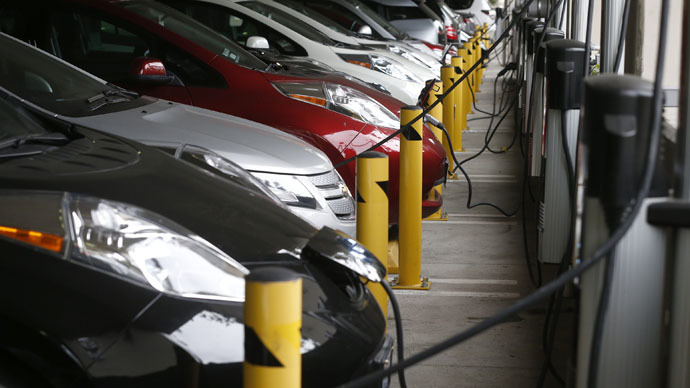Pollution no more? Electric cars could cut oil imports by 40% – study

A mass uptake of electric car usage could reduce motorists’ fuel costs by £13 billion and drive down the UK’s oil imports by 40 percent by 2030, a new study has suggested.
The Cambridge Econometrics study, commissioned by the European Climate Foundation, found that a surge of electric car sales would save each driver £1,000 per year and result in the near elimination of air pollutants by the middle of the century.
The reduction in pollutants such as nitrogen, oxide and particulates would in turn produce health benefits of over £1 billion by reducing the rate of respiratory diseases.
The authors note, however, that the shift towards sustainable vehicles would require investment in new infrastructure.
“There will be a transition in the next five to 10 years, but you won’t see a sudden shift to electric vehicles until consumers have got over their ‘range anxiety’ concerns and that will only happen with infrastructure spending,” said Philip Summerton, one of the report’s authors.
The problem of range anxiety – concerns that cars may run out of power between charging stations – has previously been one of the major deterrents for potential consumers.
While the European Commission proposed an infrastructure program which would have increased the numbers of charging stations in the UK to 1.2 million, the Conservatives opposed the measure due to the increased investment required.
READ MORE: Road ready? Driverless cars within 10 years, UK must prepare, say MPs
The study found the gains to be made from greater emancipation from oil could amount to between £2.4 billion and £5 billion by 2030, with between 7,000 and 19,000 jobs created.
Darren Lindsey, a spokesman for Michelin, said: “It can no longer come as a surprise to anyone that reducing emissions delivers commercial benefits to industry as well as benefits to the environment and consumers.”
“To maximize those benefits, however, international policymakers have to create a consistent and robust regulatory framework,” he said.
A recent poll from the Automobile Association found only 1 percent of drivers would currently opt for an electric car when they came to change their vehicle.
Low emissions and fuel economy, however, were ranking as important factors when choosing a new car.
“Our research shows that drivers’ attitudes are changing when it comes to choice of car. Drivers want fuel efficient cars that are also reliable, safe, comfortable and easy to service. However, there is still a massive leap of faith to be made before drivers fully embrace full zero emission vehicles,” said Edmund King, the AA president.
Summerton told the Guardian that decisions needed to be made about infrastructure before consumers start to invest.
“First you have to figure out whether to shift the hydrogen in trucks or build a pipeline [to feed refueling stations],” he said.
“Governments are reluctant to pick technology winners, but the downside is that it makes it difficult to start building the supporting infrastructure.”
“When consumers feel confident that a technology has the right supporting technology, the market will move in that direction,” he added.












